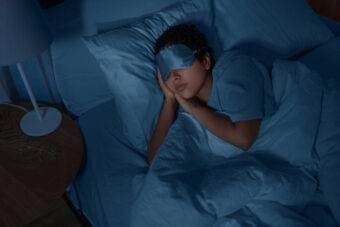5 Ways Sleep Deprivation Impacts Your Health
Posted: October 6, 2023 | By: Shanon Peckham

If you’re reading this, you’re probably familiar with the anxiety, frustration, and bone-deep exhaustion that often accompanies a night of poor sleep (or no sleep). You’re not alone, either. According to the National Heart, Lung, and Blood Institute (NHLBI), 50 to 70 million Americans struggle with sleep disorders.1 Additionally, the CDC has reported that one out of every three adults isn’t getting enough sleep every night.2
Aside from being really, really frustrating, these are some of the ways a lack of sleep, or inconsistent sleep, can impact your daily life:
1 Lower Immune Defenses
Did you know the body actually heals itself during sleep?3 While you are dreaming, your body is hard at work fixing up your immune system (and the rest of you) for a brand-new day. Cutting your sleep short lowers your defenses, which means you’re more likely to catch a cold.4 Over time, chronic sleep loss can also increase your risk of having a heart attack, stroke, or developing diabetes.5 Yikes!
2 Decreased Productivity
Just because you can technically get by on four hours of sleep doesn’t mean you should. Sleep deprivation can leave you feeling distracted or sleepy at the worst times: at school, work, in the car, etc. Apparently, it’s so bad that 40% of us are accidentally nodding off randomly during the day!1 Less sleep for our brains means slower response times, shorter attention spans, and issues with short-term memory, which could lead to serious accidents (like car collisions or exercise injuries).5
3 Unstable Moods
You don’t need a doctorate to figure out that sleep affects mood; just look at how grumpy your student, spouse, or coworker is after an all-nighter. That being said, the experts have confirmed that a lack of sleep (or disruption of sleep) does affect the way you feel emotionally the next morning.6 Without the right amount of REM sleep, your brain can’t process the emotions and memories you experienced throughout the day. This may leave you feeling raw, tense, confused, or upset the next day.7 Chronic sleep deprivation may also put you at higher risk of developing mental health issues, such as anxiety disorder.8
4 Poor Communication
So, you’ll be feeling scatterbrained and tense, but unfortunately, your sleep-deprived emotional turmoil doesn’t end there. A 2013 study9 revealed that poor sleep can lead to worse fights and even decreased empathy between partners; in short, it means you’ll be crankier with the people you care about most. Add in opposing sleep schedules, which can drive a wedge between couples or roommates,10 and you’re looking at a rather unpleasant home environment.
5 LoweR Energy
Especially if you’re pursuing a new fitness or nutrition regimen, you’ll want to keep your strength up by getting plenty of rest. Less sleep = poorer athletic performance and a greater risk of injuries. In fact, the more sleep the better when it comes to sports; one study demonstrated that additional sleep improved athletes’ speed and accuracy.11 As an added bonus, getting the extra zzz’s will also make you appear healthier and more attractive to other people!12
How you can get a better night’s rest
Despite what you might think, you actually have more control over your sleep schedule than you realize. According to the experts, creating a consistent, relaxing nighttime routine is key to getting more zzz’s.13 Rather than hitting the pillow, popping a sleeping pill, and hoping for the best, you can fix your sleep cycle by practicing a gradual wind-down to sleep. That means putting away screens, creating a safe space for self-care, and sticking to a regular sleep time every night – even on weekends.
We created a gentler, all-natural sleep aid alternative we think you’ll love to help you out with your new bedtime routine. With only 344 mcg (less than one mg) of plant-based melatonin, body-calming amino acids, and relaxing botanicals, our new Beyond Sleep GummiesTM are designed to help you make this gradual transition to sleep even easier. No more sleepless nights or groggy mornings – just a restful, good night’s sleep.
SOURCES
1 What Are Sleep Deprivation and Deficiency?, NIH National Heart, Lung, and Blood Institute
2 Do You Get Enough Sleep?, Centers for Disease Control and Prevention
3 The Benefits of Slumber, NIH News in Health
4 Sleep and immune function, 2012
5 Sleep Disorders and Sleep Deprivation: An Unmet Public Health Problem, Chapters 3 & 4, 2006
6 Relationship Between Sleep Quality and Mood: Ecological Momentary Assessment Study, 2019
7 Mental Health and Sleep, Sleep Foundation, 2023
8 PSYCHIATRIC DISORDERS AND SLEEP, 2013
9 The Role of Sleep in Interpersonal Conflict : Do Sleepless Nights Mean Worse Fights?, 2013
10 How Sleep Affects Your Relationships, According to Science, TIME
11 How Inadequate Sleep Affects An Athlete’s Performance, Sleep Cycle Center
13 Are You Getting Enough Sleep?, Centers for Disease Control and Prevention
Posted in:

